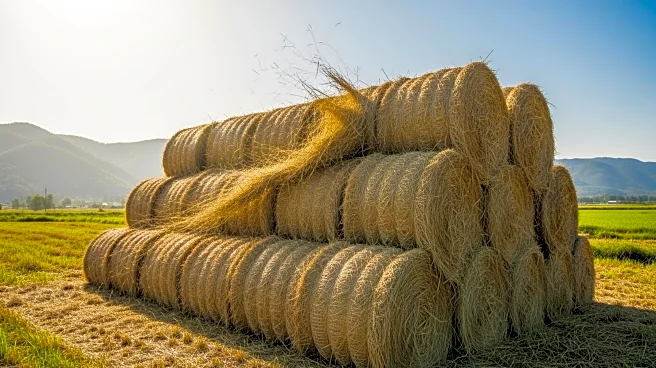What's Happening?
In Vietnam, a Farmers’ Field Day showcased the success of circular agriculture models in the Mekong Delta, transforming rice straw from a climate burden into a stable source of income. Organized by the Department of Crop Production and Plant Protection of Can Tho City, IRRI, and VIETRISA, the event demonstrated techniques for growing straw mushrooms and producing organic fertilizer from rice straw. The initiative is part of the 'One Million Hectares of High-Quality and Low-Emission Rice Program,' which aims to reduce emissions and improve farmer income. The program has led to the formation of sustainable business models, creating jobs and increasing farmer income compared to traditional rice cultivation.
Why It's Important?
This initiative is crucial for Vietnam's agricultural sector, as it addresses both economic and environmental challenges. By turning rice straw into valuable products, the program reduces pollution from straw burning and provides farmers with new income streams. The success of the circular economy model demonstrates the potential for sustainable agricultural practices to enhance food security and reduce emissions. The initiative also highlights the importance of training and capacity-building for farmers, which can lead to more resilient agricultural systems.
What's Next?
To sustain progress, local governments and the agricultural sector must prioritize supportive policies and incentives for farmers. Strengthening cooperatives and establishing robust value chains will be essential for connecting farmers with businesses using straw for products like animal feed and bio-energy. The use of digital tools, such as the IRRI-developed Easy Farm App, will streamline transactions and support the expansion of circular agriculture models. Continuous technical support and knowledge-sharing will be crucial for scaling these models throughout the region.
Beyond the Headlines
The initiative reflects a broader shift towards sustainable agriculture, where waste products are seen as valuable resources. By integrating circular economy principles, Vietnam's agricultural sector can contribute to global efforts to combat climate change. The program also highlights the role of innovation and collaboration in driving positive change, setting an example for other countries facing similar challenges.









